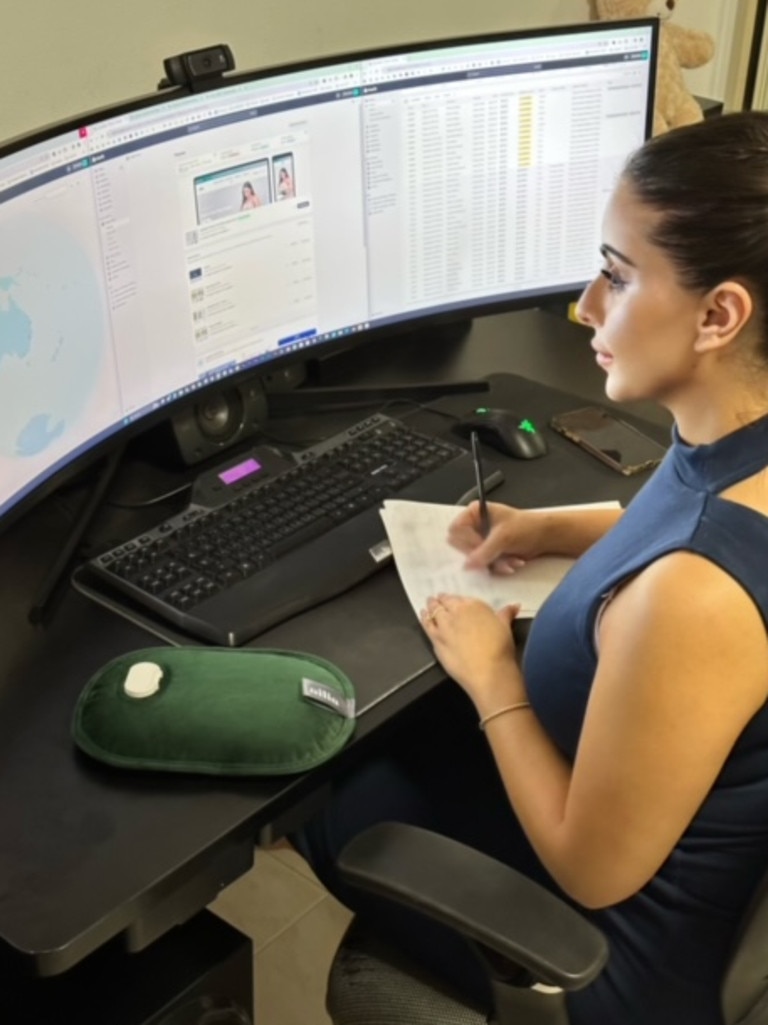An image of a desk exposes a problem many Aussies still face at work
A photo of a work desk has exposed an issue many Aussies are dealing with in the workplace, after one young woman finally spoke out.
Danielle Whba was working in a law firm when she was told the hot water bottle she kept at her desk wasn’t very “professional”.
Ms Whba was working as a receptionist in 2019, living with endometriosis and battling chronic pain.
The young professional was 20 at the time and said that while she always focused on her work, she was often living with a “stabbing pain” that, at times, she felt in every inch of her body.
“It is stabbing, it is cramping, and it takes over your whole body. You feel it everywhere. You even feel it in your legs,” she said.


Throughout the work day, she would discreetly try to go for a walk to relieve her pain, or duck into the kitchen to take Panadol or Nurofen to help with symptoms.
Her aim was for her co-workers not to notice she was sick, and she’d often wear bulky clothing to disguise the hot water bottle she frequently needed at her desk.
“I’d ensure I was wearing layers, tuck it in my pants and put my jumper over it,” she told news.com.au.
Eventually, she felt comfortable telling her employer that she was living with endometriosis and “trusted” they’d understand.
It was still a tough call to make because she always feared her endo would be thrown in her face, and someone would tell her she was overreacting, and it was “just a period.”
That didn’t happen … but she still came to regret the disclosure.

Ms Whba said she’d left work early one day because she was in such horrific pain that she needed to go to hospital.
It took her vomiting at work to make her actually leave and seek medical attention. After all, she wasn’t a stranger to pain; pharmaceutical treatments currently available to treat endometriosis are palliative, meaning they do not reduce or cure the disease but only work to make the person more comfortable.
She texted a co-worker to explain her absence and then went to the hospital’s emergency department.


It was during this hospital stay that she was diagnosed with ovarian cysts on top of her endometriosis, and told that she needed surgery. Then she got a call from her boss.
He rang not to check on her, but to reveal that he wasn’t “comfortable” with someone with her “needs” returning to the office.
“He said I understand your condition, but you need days off work and rest or you’ll often get up and walk around …. I don’t want that in my office,” Ms Whba recalled.
She was fired while lying in a hospital bed in pain.
Her experience isn’t uncommon. One in six people will lose their employment due to managing their endometriosis.
The whole experience was “traumatising”, and it took her years to understand she wasn’t to blame.
“Moving forward, I never told another employer again; I was that traumatised,” she said.
Ms Whba, 27, now works part-time at a law firm and co-founded the electric water bottle company Ailia.
More Coverage
Most of the time, she’s her own boss now and, therefore, doesn’t feel like she has to hide anything that comes along with her pain management.
Medicare is failing women and it’s About Bloody Time things changed. Around one million suffer from endometriosis. There is no cure. Help is hard to come by and in rural or regional areas, it’s virtually impossible. We are campaigning for longer, Medicare-funded consultations for endometriosis diagnosis and treatment. Read more about the campaign and sign the petition here
About Bloody Time is an editorial campaign by news.com.au that been developed in collaboration with scientists recommended by the Australian Science Media Centre, and with the support of a grant from the Walkley Foundation’s META Public Interest Journalism fund.







